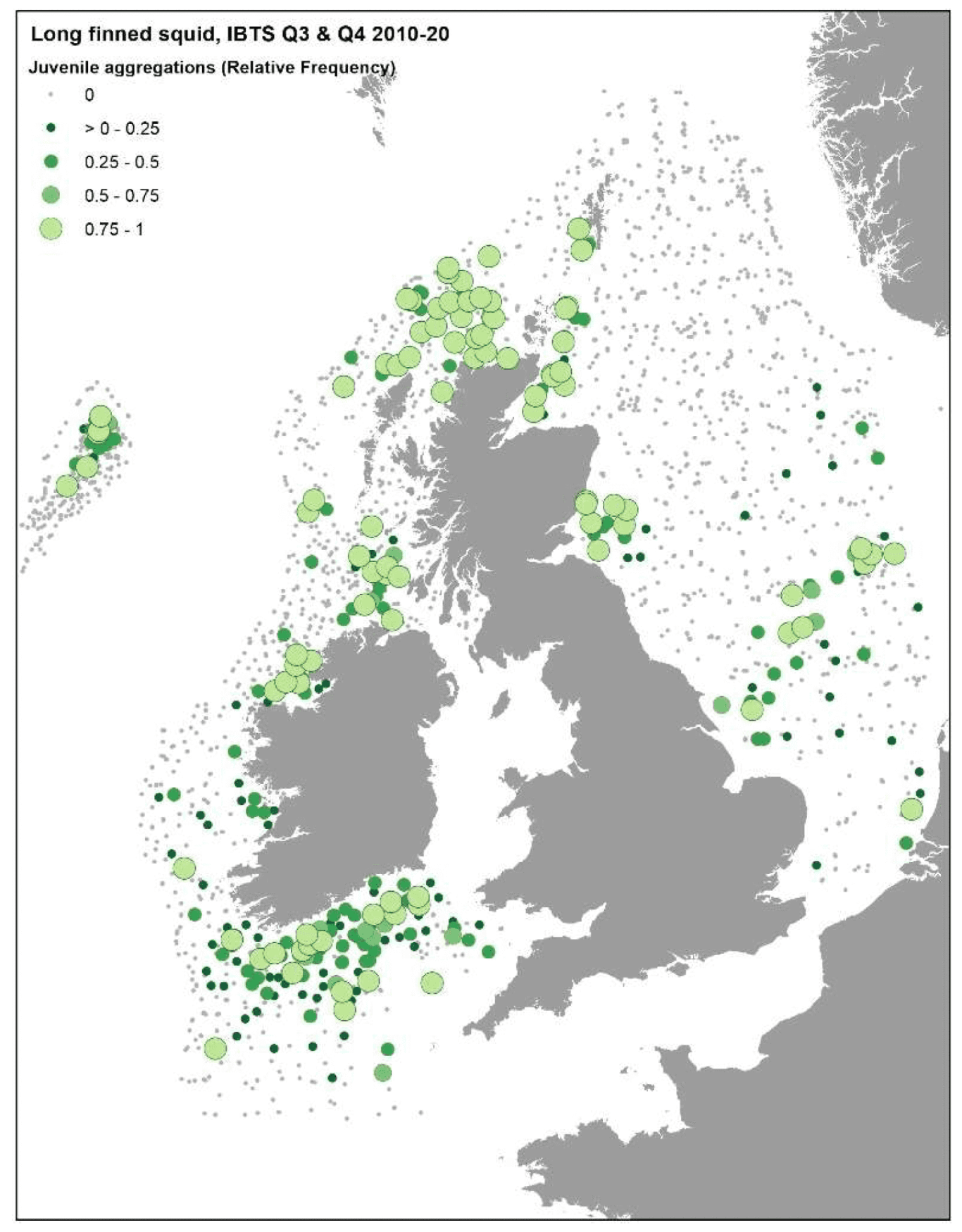www.stateofthecoast.scot
Squid (Decapodiformes)
Key Findings
Squid in Scotland
Squid play a vital role in marine food webs, acting as both predators and prey. As skilled hunters, they possess specialised adaptations that make them highly effective predators, influencing the populations of many marine species through their hunting strategies and diet. At the same time, squid are an essential prey for numerous marine animals, including salmon, cetaceans, whales and seabirds (McCallum & Das, 2022). Several species of squid can be found in UK waters, inhabiting environments ranging from shallow coastal areas to deep oceanic waters. Species found in UK include; European common squid (Alloteuthis subulata), veined squid (Loligo forbesii), European squid (Loligo vulgaris), European flying squid (Todarodes sagittatus), Boreoatlantic armhook squid (Gonatus fabricii), common clubhook squid (Onychoteuthis banksii), large bobtail (Rossia macrosoma) and Atlantic bobtail (Sepiola atlantica) (Scottish Government, 2009). Of these listed, veined squid and European squid are the two most common and commercially valuable in the UK (Cornwall Wildlife Trust, 2022).
Distribution:
Veined squid is found in the waters of the Eastern Atlantic, from the Azores to the west coast of Africa, including the Canary Islands, and extending into the Mediterranean Sea and Red Sea. In contrast, European squid is also found in the Eastern Atlantic, ranging from the British Isles and the North Sea to the Mediterranean, and as far south as the coast of Africa (Wilson, 2008). In the UK, veined squid is more abundant in northern regions, particularly in Scotland, while European squid is more common in southern UK waters. Aggregations of juvenile veined squid throughout the UK can be seen in Figure 2.
IUCN Classification & Population Trends:
Both the European squid and veined squid were last assessed in 2015 for the IUCN Red List of Threatened Species. European squid is listed as Data Deficient, indicating that there is insufficient information to determine its risk of extinction. In contrast, veined squid is classified as Least Concern, suggesting that it is currently considered to have a low risk of extinction (Allcock & Taite, 2019).
Threats to Squid Species and Their Future:
Squid, like many marine species, face significant challenges driven by human activity. This includes rising ocean temperatures linked to climate change, ocean acidification and pollution, and overfishing. In recent years, increasing demand for squid has driven a sharp rise in squid fishing vessels globally (McCallum & Das, 2022). While this trend is less evident around Scotland and the rest of the UK , growing demand and rising market value could soon lead to increased squid fishing in UK waters. Currently, cephalopods in Scotland lack welfare protections, and globally there are no comprehensive regulations or monitoring systems for squid fishing (Scottish Government, 2021). This oversight allows jiggers to operate with minimal checks, with no controls on catch size or sustainability, creating a free-for-all in the industry (McCallum & Das, 2022). In Scotland, the landings of squid have been steadily increasing, after an initial spike in 2019 (fig. 3). These figures do display a gradual increase - potentially driven by the drive in demand by foreign markets.
Outlook for Squid:
The outlook for squid species in UK waters remains positive, as many are not currently considered threatened or endangered. However, the continued expansion of the squid fishing industry and growing demand from international markets could impact the sustainability of squid populations in UK waters. To safeguard these species, it is crucial to implement welfare protections and introduce regulations for jiggers, ensuring that squid fisheries operate both ethically and sustainably.

Figure 1: Squid

Figure 2: Juvenile aggregations of long finned squid (Loligo forbesi) taken from the west coast of Scotland demersal fish survey 2013/14.

Figure 3: Landings of squid species by Scottish vessels between 2019 and 2023, created by George Trantham using data from Scottish fisheries statistics.
Notes
None
Linked Information Sheets
Key sources of Information
Allcock & Taite (2019) IUCN Red List of Threatened Species: Loligo vulgaris.
Cornwall Wildlife Trust (2022) The Dark and Inky Art of Squid Fishing.
McCallum & Das (2022) How squid fishing is harming our oceans
Greenpeace (2024) SQUIDS IN THE SPOTLIGHT: Unregulated squid fisheries are headed for disaster
MarLIN (n.d.) MarLIN - The Marine Life Information Network - Common squid (Loligo vulgaris).
Offshore Energy SEA (2009) CEPHALOPODS
Scottish Government (2023) Developing essential fish habitat maps: report.
Scottish Government (2023) Scottish Sea Fisheries Statistics
Reviewed on/by
03/02/2025 by George Trantham
16/02/2025 by Mariia Topol
04/03/2025 Ian Hay
05/03/2025 by Charlotte Tomlinson
Status
Live - next update 04/03/2026
To report errors, highlight new data, or discuss alternative interpretations, please complete the form below and we will aim to respond to you within 28 days
Contact us
Telephone: 07971149117
E-mail: ian.hay@stateofthecoast.scot
We need your consent to load the translations
We use a third-party service to translate the website content that may collect data about your activity. Please review the details in the privacy policy and accept the service to view the translations.

